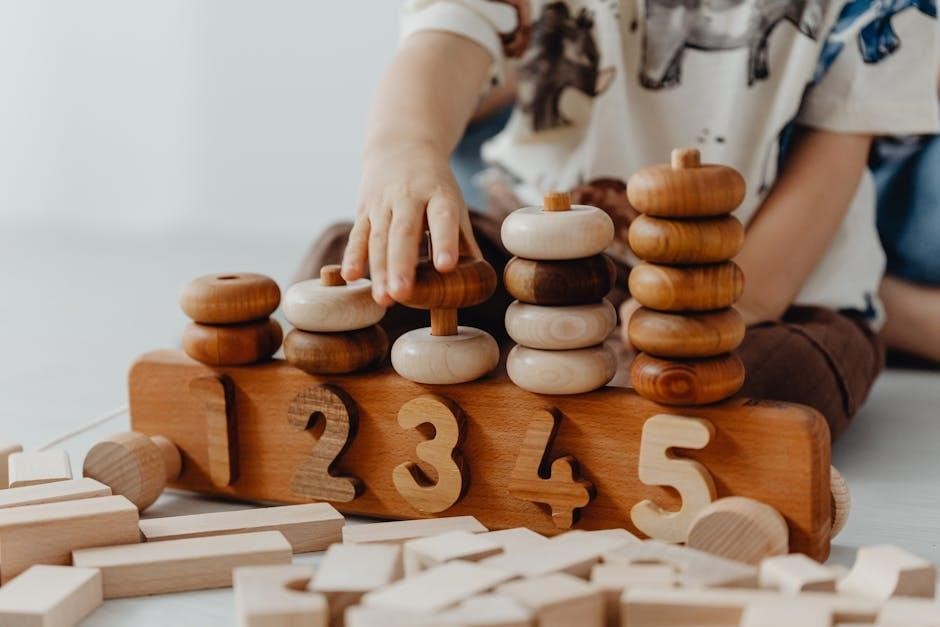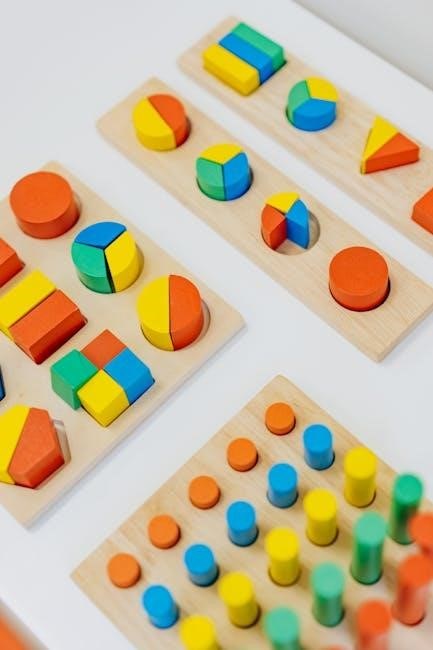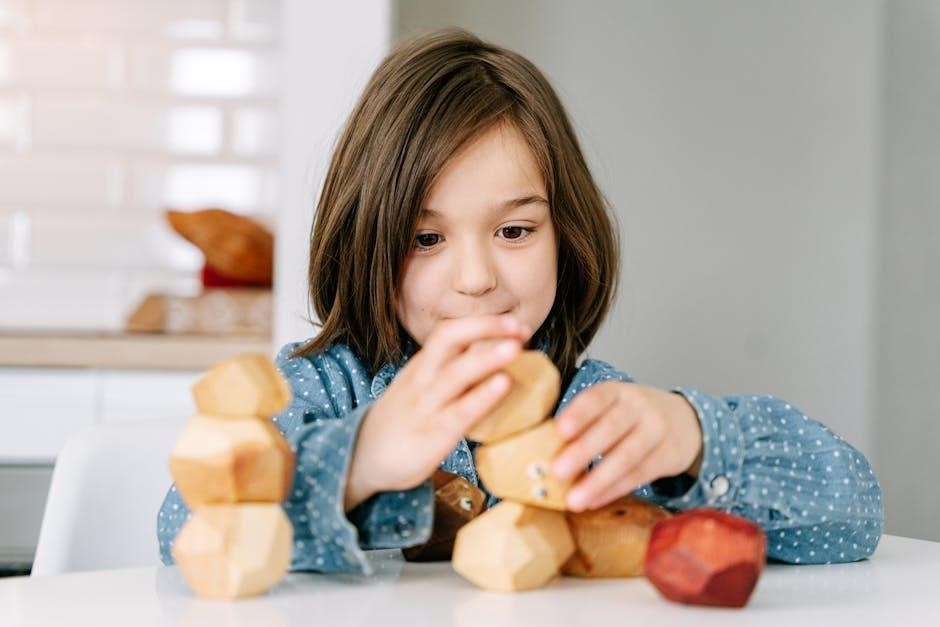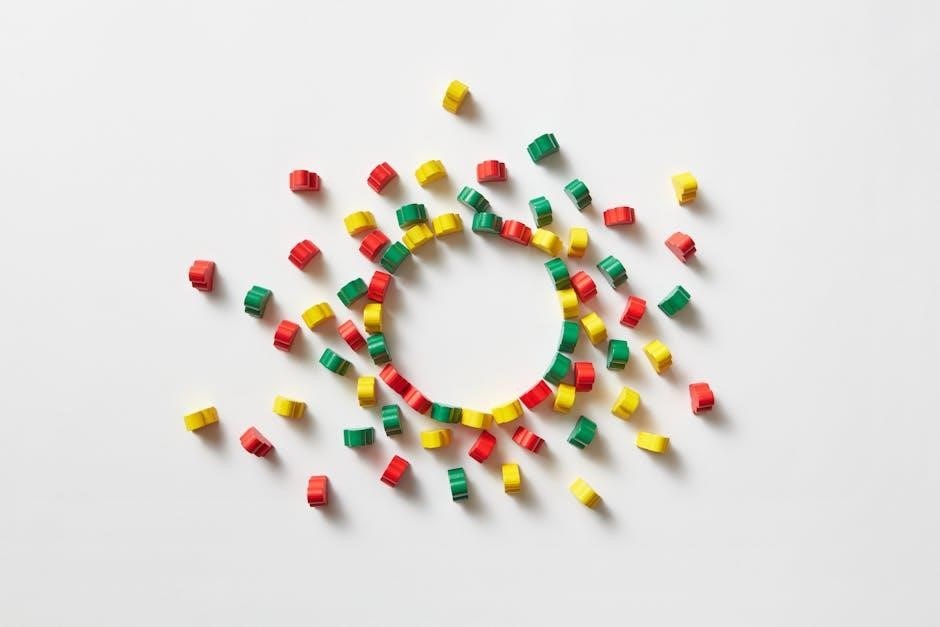A comprehensive tool to track your child’s progress, ensuring they master essential skills by the end of kindergarten, from reading to socio-emotional development, for a smooth transition to first grade.
Overview of the Importance of Assessing Kindergarten Readiness
Assessing kindergarten readiness is crucial for understanding a child’s academic and socio-emotional development. It helps identify strengths and areas needing support, ensuring a solid foundation for future learning. By evaluating skills like letter recognition, counting, and social interactions, parents and educators can guide tailored interventions. This process fosters collaboration between home and school, creating a cohesive approach to early education. A comprehensive checklist provides clarity and structure, making it easier to track progress and celebrate milestones. Ultimately, it ensures a smooth transition to first grade, setting the stage for long-term academic success and confidence.
Why Parents and Teachers Need a Comprehensive Checklist
A comprehensive checklist offers a structured way to monitor a child’s progress, ensuring alignment between home and school expectations. Teachers benefit from a clear framework to assess skills, while parents gain insights into their child’s development. This tool fosters communication, helping both parties identify areas needing support. By tracking milestones, it provides a sense of accomplishment and guides focused interventions. A detailed checklist also eases the transition to first grade, ensuring readiness and reducing anxiety. It’s an essential resource for creating a unified approach to early childhood education and fostering a child’s continued growth.

Core Skills Your Child Should Master by the End of Kindergarten
By the end of kindergarten, children should demonstrate proficiency in reading, writing, math, and socio-emotional skills, laying a strong foundation for future academic success.
Reading Skills: Recognizing Letters, Sight Words, and Basic Comprehension
By the end of kindergarten, children should recognize uppercase and lowercase letters, understand their sounds, and identify common sight words like “the” and “and.” They should demonstrate basic comprehension by discussing stories, identifying main ideas, and retelling simple narratives. Phonological awareness, such as recognizing rhyming words and syllables, is also key. Use the checklist to track progress in these areas, ensuring your child is well-prepared for first-grade reading challenges. Encourage daily reading practice and celebrate milestones achieved throughout the year.
Writing Skills: Tracing, Drawing, and Simple Sentence Formation
By the end of kindergarten, children should demonstrate foundational writing skills, starting with tracing shapes and letters. They should draw pictures to convey meaning and write their name legibly. Simple sentence formation, such as combining two or three words, is expected. The checklist includes milestones like using capitalization, spacing between words, and writing sight words. Encourage practice with worksheets and creative writing activities to build confidence and fine motor skills. Celebrate progress as they transition from scribbles to meaningful written expressions, ensuring readiness for first-grade writing challenges.
Math Skills: Counting, Basic Addition, and Shape Recognition
By the end of kindergarten, children should demonstrate proficiency in counting up to 100 by ones and tens, recognizing and writing numbers up to 20, and understanding basic addition concepts within 10. They should identify and name basic shapes, such as squares, circles, triangles, and rectangles, and demonstrate an understanding of sorting and categorizing objects. These skills lay the foundation for problem-solving and real-world applications. Use visual aids and hands-on activities to reinforce learning, ensuring a strong mathematical foundation for future grades.

Socio-Emotional Development
By the end of kindergarten, children should exhibit self-awareness, cooperation, and emotional regulation, fostering positive interactions with peers and teachers, while demonstrating empathy and confidence in social settings.
Self-Confidence and Independence in Daily Tasks
By the end of kindergarten, children should demonstrate self-confidence by taking ownership of their actions and expressing their thoughts and feelings clearly. They should show independence in completing simple tasks, such as dressing, using the restroom, and organizing personal items. Encouraging self-reliance fosters resilience and problem-solving skills. Additionally, children should exhibit curiosity, take initiative in learning, and feel comfortable making decisions. Building confidence helps them navigate social interactions and approach challenges with enthusiasm, laying a strong foundation for future academic and personal growth.
Cooperation and Friendship Skills
By the end of kindergarten, children should demonstrate the ability to play cooperatively with peers, share materials, and take turns. They should show respect for others’ feelings and ideas, express kindness, and display empathy. Cooperation skills include working together in group activities and contributing to shared goals. Friendship skills involve initiating or responding to invitations to play and maintaining positive interactions. Encouraging these abilities helps children build strong relationships and develop a sense of belonging in their social circle, fostering a positive and inclusive classroom environment.
Emotional Regulation and Empathy
By the end of kindergarten, children should begin to demonstrate emotional regulation by managing feelings and calming themselves during upsetting situations. They should show empathy by recognizing and responding to others’ emotions, offering comfort when needed. Skills include identifying and expressing their own emotions clearly, understanding different feelings, and developing self-awareness. Encouraging these abilities helps children build positive relationships, navigate social situations, and develop a caring attitude toward others. This foundation supports their emotional well-being and fosters a supportive classroom environment.

Additional Resources and Tools
Find printable checklists, memory books, and worksheets to track progress and celebrate milestones, ensuring a smooth transition to first grade with organized resources and tools.
Printable Checklists and Worksheets for Parents
Printable checklists and worksheets offer parents a structured way to monitor their child’s progress in reading, writing, math, and socio-emotional skills. These downloadable PDF tools provide a clear framework to track milestones, identify strengths, and address areas needing improvement. With organized resources, parents can celebrate achievements and ensure their child is well-prepared for first grade. These materials are designed to be user-friendly, helping families stay organized and focused on supporting their child’s growth effectively.
End-of-Year Memory Books and Keepsake Ideas
End-of-year memory books and keepsakes are a heartfelt way to celebrate your child’s kindergarten journey. Create a scrapbook filled with photos, artwork, and handwritten notes documenting their progress. Include milestones from the checklist, such as their first written sentence or favorite sight words. Personalize it with mementos like class projects or event tickets. These keepsakes not only preserve memories but also serve as a reflection of their growth. Involving your child in the process makes it a meaningful activity, allowing them to cherish their accomplishments and look forward to future successes.

Preparing for the Transition to First Grade
Use the end-of-kindergarten checklist to identify strengths and areas needing attention, ensuring a smooth transition. Collaborate with teachers, and create a summer learning plan to foster continued growth.
Key Milestones to Ensure Readiness
By the end of kindergarten, children should demonstrate mastery of core skills such as recognizing letters, sight words, and basic math concepts. They should also show independence in daily tasks, cooperation with peers, and emotional regulation. The checklist helps identify if your child can write their name, count up to 100, and understand simple stories. Additionally, socio-emotional milestones, like sharing, taking turns, and expressing feelings, are crucial. Ensuring these key areas are met will provide a solid foundation for first grade and promote confidence in their academic and personal growth.
How to Use the Checklist for a Smooth Transition
Utilize the end-of-kindergarten checklist to identify your child’s strengths and areas needing support. Review each section, from reading to socio-emotional skills, and discuss results with teachers. Highlight mastered skills to celebrate progress and pinpoint where extra practice is needed. Share the checklist with first-grade teachers to ensure a tailored approach. By understanding gaps, you can provide targeted summer activities, fostering a seamless transition. This tool helps align efforts between home and school, ensuring your child feels prepared and confident for the next academic milestone.

End-of-Year Assessments and Reporting
Evaluate your child’s progress with a detailed checklist, tracking skills in reading, writing, math, and socio-emotional development. Use examples of report card comments to provide clear feedback and guide parent-teacher discussions, ensuring a comprehensive understanding of their readiness for first grade.
Examples of Report Card Comments for Kindergarten
Clear and constructive feedback is essential for tracking progress. Example comments include: “Shows ability to recognize and name uppercase and lowercase letters,” “Demonstrates emerging skills in counting up to 100,” and “Exhibits cooperation during group activities.” Use specific statements like, “Consistently uses sight words to read simple sentences,” or “Shows independence in completing daily tasks.” For socio-emotional growth, comments might include, “Displays empathy toward peers” or “Uses strategies to regulate emotions.” These examples provide a framework for creating meaningful feedback, helping parents and teachers understand a child’s strengths and areas for growth, while aligning with checklist criteria for a smooth transition to first grade.
Using the Checklist for Parent-Teacher Conferences
The end-of-kindergarten checklist is a valuable tool for parent-teacher conferences, providing a clear overview of your child’s skills and progress. It helps identify strengths, such as letter recognition or cooperation, and areas needing support, like sight word mastery or emotional regulation. Teachers can use the checklist to create personalized feedback, while parents gain insights into their child’s readiness for first grade. This structured approach fosters collaborative discussions, ensuring everyone is aligned on goals and strategies for continued growth. It also offers a starting point for addressing any concerns and celebrating achievements together.
Celebrating Your Child’s Progress
Celebrate your child’s growth with positive reinforcement, acknowledging their achievements in reading, writing, and socio-emotional skills. Use the checklist to track milestones and create a joyful end-of-year experience.
Ways to Acknowledge Achievements
Celebrate your child’s milestones by creating a memory book or scrapbook documenting their progress. Use the end-of-kindergarten checklist to identify and highlight their strengths and improvements. Offer genuine praise and encouragement, focusing on effort and growth. Consider hosting a small celebration or sharing achievements with family and friends. Printable certificates from the checklist PDF can serve as tangible rewards. Encourage your child to reflect on their journey, fostering a sense of pride and accomplishment. This positive reinforcement will build confidence and excitement for the next grade, making the transition a joyful experience.
Creating a Positive End-of-Year Experience
End the kindergarten year on a high note by focusing on fun and reflection. Organize classroom parties, talent shows, or picnics to celebrate progress. Use the checklist to create personalized memory books, highlighting each child’s growth. Incorporate activities that allow students to share their favorite moments, fostering camaraderie. Ensure the transition to first grade feels exciting by discussing new adventures. Provide parents with resources from the checklist PDF to support summer learning. Emphasize effort and improvement, ensuring every child feels proud of their achievements. This positive closure sets the stage for a confident start to first grade.
Use the end-of-kindergarten checklist to celebrate milestones, track growth, and prepare for first grade. It’s a valuable tool to guide continued learning and development with confidence.
Final Tips for Supporting Your Child’s Continued Growth
Use the end-of-kindergarten checklist to identify strengths and areas for improvement. Encourage daily reading, writing, and math practice through fun activities. Foster socio-emotional growth by promoting play and open conversations about feelings. Maintain a consistent routine to support learning and independence. Celebrate milestones to build confidence and a love for learning. Stay connected with teachers for personalized guidance and resources. By fostering curiosity and providing support, you’ll help your child thrive academically and emotionally beyond kindergarten.



